
Blooming in late February, daffodils mark the beginning of the spring in Atlanta.
The breeze of Nowruz is blowing from the land of the beloved
Ask this wind to help delight your heart
Hafiz, poem 454 of the Divan
They were to observe them as days of feasting and merrymaking, and as an occasion for sending gifts to one another and presents to the poor.
Book of Esther 9:22
On the occasion of Nowruz, the Persian New Year (March 19), and the Jewish holiday Purim (evening of March 23 – March 24), it is our pleasure to introduce our new libguide “Foundational Texts from the Middle East” that brings together resources housed across Emory Libraries. It presents four manuscripts from the Rose Library’s Ancient, Medieval, and Renaissance eastern and western manuscript collection, 347-1653 written in Arabic, Persian, and Hebrew and connects them with scholarly works that highlight their historical, cultural, and literary significance. Some pages of Divan Hafiz, pages from the Qur‘an, and two scrolls, the Book of Esther and the Torah, form part of the special collection on which our libguide builds. Whereas the Rose Library’s finding aid calls attention to the uniqueness of these objects, we underscore the importance of their contents, four seminal texts, by sampling the scholarly research available in Emory Libraries that the four texts inspired. These academic and literary works highlight the cultural productivity and diversity of the ancient and medieval Middle East. By pointing out the proximity of the two joyous holidays, we further underline the close exchanges between the cultures that produced these texts and the peoples cultivating them.
- Divan Hafiz دیوان حافظ
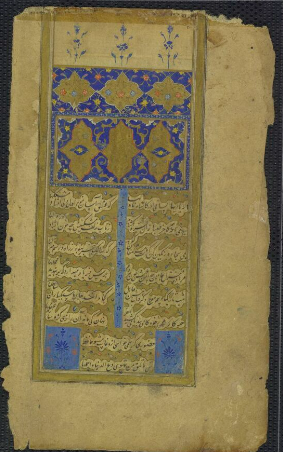
Page from an illuminated manuscript from the Rose Library’s collection.
The illuminated manuscript pages from the Divan Hafiz display a ghazal (love poem), written in Persian script; however, the first and last lines of the poem are in Arabic. This is a love poem titled ناولها و کاسا ادر الساقی ایها یا اال O Saqi, come pass the cup ’round and fill it up. It is the opening poem in the divan and the first among Hafiz’s poems to be translated into a European language. Indeed, Hafiz’s poetry enchanted eighteenth–century Europe as much as it continues to define classic Persian poetry today. Our libguide samples the translations and editions of Hafiz’s poems and the scholarly works Hafiz’s writings and time inspired available in Emory libraries.
2. Qur’an قرآن
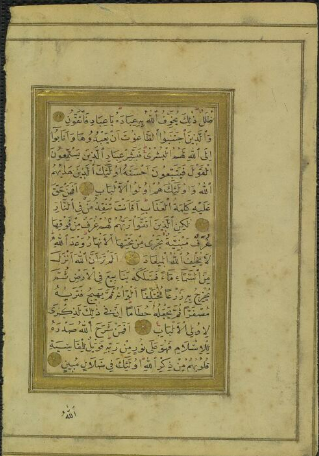
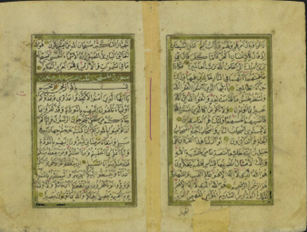 The lines in Arabic in Hafiz’s ghazal indicate the fruitful encounter between the cultures of Persian and Arabic speakers, the importance of Arabic in the region, and its centrality to Islam. The Rose Library’s illuminated manuscript pages contain parts of the Qur’an, widely regarded as the finest work in Arabic literature. Recorded on these pages are three of the Qur’an’s 114 Surahs (chapters): Surah Hashr (verses 15 to 24), Surah Mumtahannah (verses 1 to 3) —see the page on the right — and Surah Al-Zuman (verses 16 to 22) — on the left.
The lines in Arabic in Hafiz’s ghazal indicate the fruitful encounter between the cultures of Persian and Arabic speakers, the importance of Arabic in the region, and its centrality to Islam. The Rose Library’s illuminated manuscript pages contain parts of the Qur’an, widely regarded as the finest work in Arabic literature. Recorded on these pages are three of the Qur’an’s 114 Surahs (chapters): Surah Hashr (verses 15 to 24), Surah Mumtahannah (verses 1 to 3) —see the page on the right — and Surah Al-Zuman (verses 16 to 22) — on the left.
3. Torah תורה
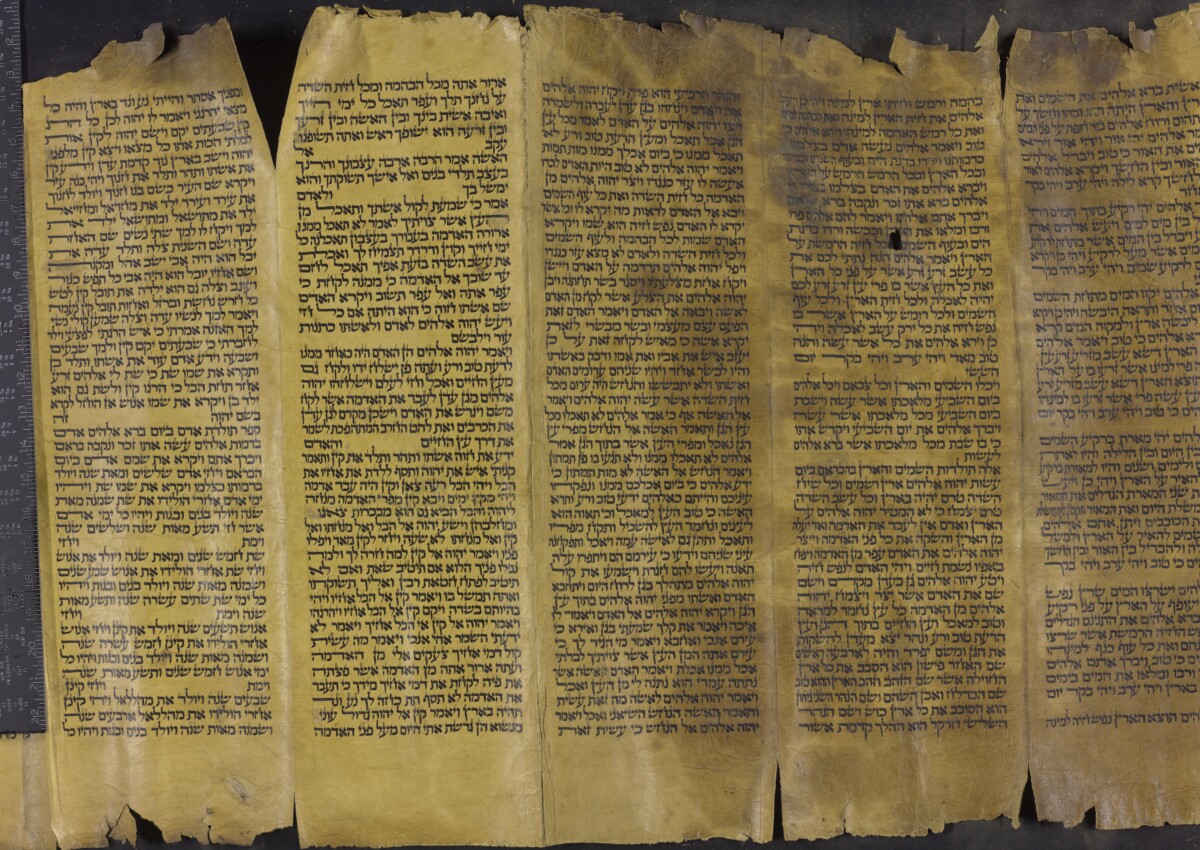
Torah scroll from the Rose Library’s collection.
As it is well known and several of the scholarly works in Emory Libraries demonstrate, the Qur’anic text as well as Muslim traditions and thought developed in dialogue with Christian and Jewish sources. Among them, the stories and teachings of the Hebrew Bible, Tanach תנ”ך, are of primal importance. The Torah scroll housed in the Rose Library preserves the text, handwritten in Hebrew script, of the Five Books of Moses or Pentateuch, constituting the first section of the Hebrew Bible. The study of this text for centuries has spearheaded theological and humanistic inquiry, and today, as our libguide indicates, it continues to preoccupy scholars across various disciplines, artists, and non-academics alike. Their works are accessible in various Emory library units.
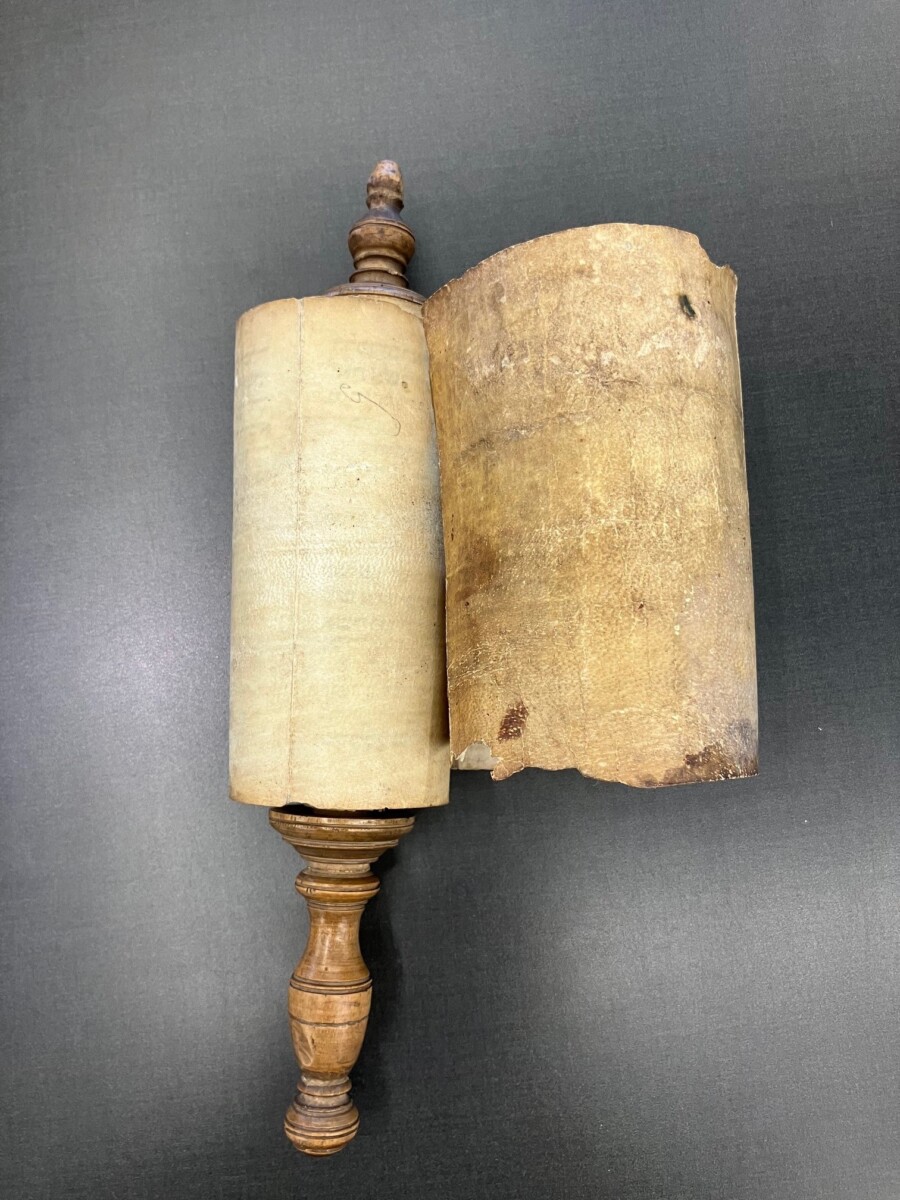
Book of Esther on small scroll from the collection of the Rose Library
4. Book of Esther מגילת אסתר
The Book of Esther is likewise part of the Hebrew Bible. It is included in its third section, Writings כתובים, and is one of the five scrolls, megillot מגילות, included in this section (the other four being Song of Songs, the Book of Ruth, the Book of Lamentations, and Ecclesiastes). It tells the story of Esther, the young Jewish woman who becomes queen of Persia and successfully prevents the evil prime minister Haman’s plan to annihilate the Jews of the empire. Our libguide, far from being exhaustive, documents the passion of scholars studying this text for its literary and historical aspects. In Judaism, the fortunate deliverance from death and triumph over the enemies of the Jews in Persia on the thirteenth and fourteenth of the Hebrew month of Adar is celebrated every year (on the same day) during Purim, when the whole book is read (multiple times) by the congregation. In the lunisolar Hebrew calendar, this period often coincides with the spring equinox, marking the arrival of the Persian New Year according to the Solar Hijri calendar.
We invite the Emory community to explore the rich and diverse scholarship in Emory Libraries that, written in various languages, shed light on these texts from multiple perspectives and elucidate the many ways in which their readers have sought inspiration, comfort, and knowledge in them in the past and continue reading them for enrichment today.
—Neda Zeraatkar, Middle East and Islamic Studies librarian, and Katalin Rac, Jewish Studies librarian
